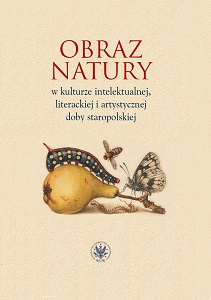Dlaczego „z morza wszytki gwiazdy żyją”? Źródła, znaczenia i funkcje motywu gwiazd pijących morze u Jana Kochanowskiego
Why do “all the stars from the sea live”? The Sources, Meanings and Functions of the Sea Drinking Stars in Kochanowski’s Poetry
Author(s): Agata Starownik
Subject(s): Cultural history, Studies of Literature, Theory of Literature
Published by: Wydawnictwa Uniwersytetu Warszawskiego
Keywords: stars; sea; Jan Kochanowski; epigram; natural science; fire; water; elements; Aristotle; Plato; the end of the world; disaster; Claudius Ptolemaeus; Diogenes Laertius; Seneca; Pliny; Cleanthe; Cicero
Summary/Abstract: The texts explores the origin of the “stars from the sea” motif in two Jan Kochanowski’s epigrams: On Drunkards and Prayer for Rain in the view of old natural science concepts. The literary perspectives of the motif, which is used in two thematically different epigrams, is explored to show how natural science knowledge of the poet (derived from ancient works – in this case most probably from Cicero’s De natura deorum) translates into his poetic language. The motif can be understood more widely as the birth of fire from water. This is why, after presenting the problem and the epigrams with the discussed motif, the relation between these two elements, according to Aristotle and Plato as the founders of the old thought concerning man, nature and cosmos, was recollected. Then the stoic tradition, which is the main context and the source of the work, was described. The argument was illustrated with the quotations from Claudius Ptolemaeus, Diogenes Laertius, Seneca, Pliny, Cleanthes and Cicero. Also, the notion of balance and the end of the world according to stoics and epicureans (Lucretius) was compared. As the last context, selected mentions referring to elements and cosmic doomsday in the Bible (the Book of Wisdom and the Apocalypse of St. John) were presented. In subsequent parts of the text the epigrams are discussed in view of other Kochanowski’s poems, especially those referring to the harmony of elements and its imbalance during natural disasters. The fragments analysed include: the so-called Psalm of Flood, the poems: God, What Do You Want from Us for Your Generous Gifts? Phenomena, Psalms 65, 29 and 104, Accord and one of the epigrams To Love. Finally, the meaning of On Drunkards was interpreted as a convivial text in the context of Foricoenium 12, and the conclusions were drawn concerning the two epigrams: the defence of carefree drinking and a fervent prayer at the time of drought.
Book: Obraz natury w kulturze intelektualnej, literackiej i artystycznej doby staropolskiej
- Page Range: 288-312
- Page Count: 25
- Publication Year: 2020
- Language: Polish
- Content File-PDF

